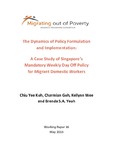| dc.contributor.author | Koh, Chiu Yee | |
| dc.contributor.author | Goh, Charmian | |
| dc.contributor.author | Wee, Kellynn | |
| dc.contributor.author | Yeoh, Brenda S.A. | |
| dc.coverage.spatial | Singapore | |
| dc.date.accessioned | 2019-12-12T15:50:38Z | |
| dc.date.available | 2019-12-12T15:50:38Z | |
| dc.date.issued | 2016-05-01 | |
| dc.identifier.uri | https://opendocs.ids.ac.uk/opendocs/handle/20.500.12413/14850 | |
| dc.description.abstract | Using the process-tracing methodology, this paper aims to outline the causal mechanisms that led to the formulation of the day off policy for migrant domestic workers in Singapore. Specifically, our analysis will focus on the three “I”s: ideas, interests and institutions. We argue that the day off policy was first brought to the agenda by the campaigning efforts of local migrant rights groups. The government’s commitment to safeguarding Singapore’s international reputation provided further impetus for the improvement of employment conditions for migrant domestic workers by means of the day off policy. Finally, Singaporeans’ dependence on migrant domestic workers provided an economic imperative for the introduction of the day off policy: it was a means to enhance Singapore’s appeal in order to attract a steady supply of migrant domestic workers, especially amidst fears of a supply crunch of these workers. | |
| dc.description.sponsorship | DFID | |
| dc.language.iso | en | |
| dc.publisher | Migrating out of Poverty | |
| dc.title | The Dynamics of Policy Formulation and Implementation: A Case Study of Singapore’s Mandatory Weekly Day off Policy for Migrant Domestic Workers | |
| dc.type | Other | |
| dc.rights.holder | University of Sussex | |
| dc.identifier.externaluri | http://www.migratingoutofpoverty.org/files/file.php?name=wp36-koh-et-al-2016-the-dynamics-of-policy-formulation-and-implementation.pdf&site=354 | |

